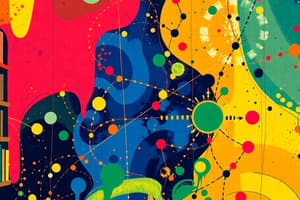Podcast
Questions and Answers
What is the primary goal of information architecture?
What is the primary goal of information architecture?
- Developing software for data management
- Creating engaging digital content
- Ensuring usability, searchability, and accessibility of information systems (correct)
- Designing efficient organizational structures
Which of the following career paths specifically focuses on the organization and sharing of expertise within organizations?
Which of the following career paths specifically focuses on the organization and sharing of expertise within organizations?
- Archivists
- Knowledge Managers (correct)
- Information Scientists
- Digital Librarians
In the context of emerging technologies, which tool can significantly enhance information analysis and access?
In the context of emerging technologies, which tool can significantly enhance information analysis and access?
- Manual filing systems
- Printed materials
- Artificial intelligence (correct)
- Static databases
What key ethical consideration involves understanding and respecting various perspectives in information management?
What key ethical consideration involves understanding and respecting various perspectives in information management?
Which degree level is not mentioned as a pathway for pursuing a career in Library and Information Science (LIS)?
Which degree level is not mentioned as a pathway for pursuing a career in Library and Information Science (LIS)?
What is the primary function of library and information science (LIS)?
What is the primary function of library and information science (LIS)?
Which area of study focuses on selecting and acquiring relevant materials?
Which area of study focuses on selecting and acquiring relevant materials?
Which classification system is commonly used to organize information resources?
Which classification system is commonly used to organize information resources?
Information literacy is primarily aimed at helping users to:
Information literacy is primarily aimed at helping users to:
How has technology affected the field of library and information science?
How has technology affected the field of library and information science?
Which method is commonly used to understand user needs in LIS?
Which method is commonly used to understand user needs in LIS?
What is NOT an aspect of information retrieval?
What is NOT an aspect of information retrieval?
What role do LIS professionals play in information literacy?
What role do LIS professionals play in information literacy?
Flashcards
Information Architecture
Information Architecture
Designing and organizing information systems to ensure usability, searchability, and accessibility.
Information Policy
Information Policy
Creating and enforcing policies to ensure access to and quality of information, considering copyright, intellectual property, and data privacy.
Knowledge Management
Knowledge Management
Developing and implementing systems for creating, organizing, and sharing expertise within organizations.
Web Information Design
Web Information Design
Signup and view all the flashcards
Emerging Technologies
Emerging Technologies
Signup and view all the flashcards
What is Library and Information Science (LIS)?
What is Library and Information Science (LIS)?
Signup and view all the flashcards
What is Collection Development?
What is Collection Development?
Signup and view all the flashcards
What is Cataloging and Classification?
What is Cataloging and Classification?
Signup and view all the flashcards
What is Information Retrieval?
What is Information Retrieval?
Signup and view all the flashcards
What is Information Literacy?
What is Information Literacy?
Signup and view all the flashcards
What are Digital Libraries?
What are Digital Libraries?
Signup and view all the flashcards
What are User Studies and Services?
What are User Studies and Services?
Signup and view all the flashcards
How has Library and Information Science evolved over time?
How has Library and Information Science evolved over time?
Signup and view all the flashcards
Study Notes
Core Concepts
- Library and information science (LIS) is a multidisciplinary field encompassing the principles, practices, and technologies of organizing, managing, and disseminating information.
- LIS draws upon knowledge from various disciplines, including librarianship, information retrieval, computer science, and communication studies.
- LIS professionals play a critical role in ensuring information accessibility, promoting information literacy, and supporting research and learning.
- The primary function of LIS is collecting, organizing, and providing access to information resources for diverse user groups.
Key Areas of Study
- Collection Development: Strategies for selecting and acquiring appropriate materials (books, journals, databases, digital resources) based on user needs, budget constraints, and institutional objectives.
- Cataloging and Classification: Standardized methods for describing and organizing information resources, enabling efficient retrieval. Common classification systems include the Library of Congress Classification and Dewey Decimal Classification.
- Information Retrieval: Techniques and methods for effectively searching and locating information across various sources like databases, online archives, and digital libraries.
- Information Literacy: Educating users about information resources, evaluating their credibility, and using them responsibly for diverse purposes (academic, research, personal).
- Digital Libraries: Management and access to digital information resources including e-books, online journals, e-databases, and digital archives.
- User Studies and Services: Understanding user needs and behaviors to provide effective information services through methods like interviews, surveys, and observations.
Historical Context
- Early forms of library organization developed over centuries, evolving from simple collections to sophisticated systems for managing information.
- The formalization and professionalization of LIS occurred primarily during the late 19th and 20th centuries, driven by technological advancements and the increasing need for organized information access.
- Technological progress has significantly reshaped the field, with digital information assuming greater importance.
Modern Applications
- Information Architecture: Designing and organizing information systems for usability, searchability, and accessibility.
- Knowledge Management: Developing and implementing systems to create, organize, and share expert knowledge within organizations.
- Web Information Design: Applying LIS principles to website design for effective access and usability of online resources.
- Emerging Technologies: Adapting to and integrating new technologies like artificial intelligence, machine learning, and data visualization to improve information access and analysis.
- Information Policy: Creating and implementing policies for ensuring information access and quality, addressing issues such as copyright, intellectual property, and data privacy.
Career Paths
- Librarians (academic, public, special)
- Information Scientists
- Archivists
- Knowledge Managers
- Metadata Specialists
- Digital Librarians
- Information Architects
- Web Information Specialists
Education and Training
- LIS degrees (master's, bachelor's, doctoral) provide specialized knowledge and skills for careers in LIS.
- LIS programs emphasize practical skills, theoretical frameworks, and current issues in information management.
Ethical Considerations
- Information access and privacy
- Intellectual property rights
- Bias and inclusivity in information resources
- Responsible use of technology in information management
- Respecting diverse perspectives and contexts while providing information access.
Studying That Suits You
Use AI to generate personalized quizzes and flashcards to suit your learning preferences.




